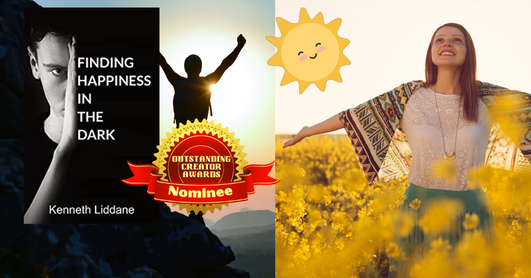|
Score: 87/100 (8.7 out of 10)
Finding Happiness in the Dark is a short and sweet self-help book by Kenneth Liddane that champions the power of positive thinking, the conservation of energy in a metaphysical sense, and one's ability find and achieve happiness. This book is summarized by one quote: “Our best hope to be happy then becomes living with a positive and constructive lifestyle, and experience each moment to its full potential which will naturally help us become aware of every emotional response including happiness.” Happiness is the key concept in this book, perhaps even above energy, which is also important. The author challenges us to really meditate on and think about the way we view happiness. Is it a state of mind? Something we achieve? Something we earn? Something that's given or granted to us for some external reason? The author challenges us to consider such questions as (to paraphrase), “Do I feel happy when _______?” and “Would I be happy if I had ________?” or “Would I be happy if I achieved _________?” The author does a great job at showing the reader that your happiness should not be contingent on external things such as winning a prize or getting a new car. There are loads of people out there who are technically “rich” but who struggle to be happy. Money does not buy happiness, and your happiness is not contingent on how much money you have or how many expensive cars or homes you own. Happiness can, however, be increased by things such as having loving friends and family, security, and a place to call home. When we concern ourselves too much about what we don't have and what we want, we often ignore and take for granted the things we already have and need. It may sound a bit cliché to summarize it this way, but true happiness comes from within. It isn't given, granted, or gifted. It is taken, accepted, and appreciated. The book also concerns stress and how it can throw our energy balance out of whack. We're not talking about calories of kilowatts here, we're talking about something more metaphysical than that: spiritual energy. You might call it willpower or morale—the drive to do and accomplish things. When stress isn't managed well, you can experience an energy drain. It can make you feel like you can't do things or don't want to do things. We've all been there at one point in our lives—when there's just too much to do, a mountain of insurmountable tasks. The author encourages us to deal with stress in a healthy way. We often tend to overdo things, and this rat race world seems to encourage it. Instead, we should handle things bit by bit, consciously and conscientiously, realizing that sometimes enough is enough and good enough is good enough. Does that mean that avoiding stress is always a good thing? No. The author advocates that some stress, like moderate exercise, is good. People forget, however, that overdoing things that they feel are “good” for them (like exercise) can actually be counterproductive. Case in point: you might think that reading a lot or studying a lot are good things, but are they good things if they lead you to lose many hours of sleep at night? The key is to remember why we do things: to enrich ourselves and our lives because doing so makes us happy. Another major concept in the book related to happiness and energy is the idea of “success.” The author concludes: “Success is a result of doing something we enjoy and makes us happy” and that all the side-benefits we get from doing what we love—money, prizes, etc.—are just that: side-benefits, extra stuff. You don't have to be the best. You don't have to win them all. But you can be the best that you can be, and you can win 'em when and where it counts. This is a worthwhile self-help book from the mind of a hynotherapist and life coach, which makes it extra interesting. The writing and formatting are passable, although leave something to be desired. For example, the author chooses omit indentations before paragraphs. They also sometimes use two punctuation marks simultaneously, such as using both a period and a question mark together. So, ultimately, this writing and formatting are a bit rough around the edges and the book itself could've used a rewrite or two. However, the concepts and ideas are very useful and inspiring. Check out this book on Amazon!
0 Comments
Leave a Reply. |
Archives
July 2024
Categories |

 RSS Feed
RSS Feed